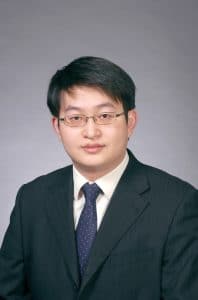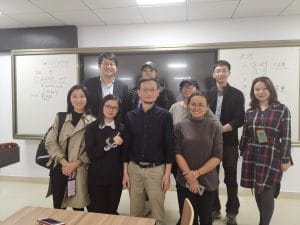China’s passed its first Charity Law in 2016, laying the legal foundation for the non-profit sector’s development and changing an unpredictable and inconsistent operating environment charitable organisations had long operated in.
As NGOs flourish, the legal needs and expectations for the nonprofit sector are growing too. In order to learn more about this growing demand, China Development Brief conducted an interview with Mr. Lu Xuan (whose English name is William), founder and board chairman of the Legal Centre for NGO (上海复恩社会组织法律研究与服务中心,thereafter “ForNGO”). Established in 2012, ForNGO is China’s first NGO form registered legal research and service centre exclusively focusing on NGOs in China. Since its birth, ForNGO have published research papers, manuals and books discussing legal problems facing organisations in the nonprofit sector. Lu Xuan’s team has held workshops to make laws and regulations known to organisations’ leaders and staff.
 Lu studied law at Law School of Fudan University in Shanghai. While practicing in 2003, he volunteered for the Grassroots Community (热爱家园), a local charitable organisation which created volunteer-engagement networks. In 2005, he was elected as a board member of the organisation.
Lu studied law at Law School of Fudan University in Shanghai. While practicing in 2003, he volunteered for the Grassroots Community (热爱家园), a local charitable organisation which created volunteer-engagement networks. In 2005, he was elected as a board member of the organisation.
An experience in 2011 inspired Lu to devote himself to Charity Law. A training camp for human rights lawyers co-hosted by the Constitution and Human Rights Committee of all China Lawyers Association and the Law School of Peking University and sponsored by the European Union took place in Beijing. Lu was one of the attendees. Lu said the camp deepened his understanding of the law related to public interests, and most importantly, his commitment to human rights. Lu visited individuals in the nonprofit sector and two foundations after the camp. “Then I realised our problems,” said Lu. “We had actually done many different programmes in the Grassroots Community, concerning law, environment protection, migrant worker’s children’s education and disaster relief, but we were far from being professional. We did not have a good understanding of NGOs, either. From that moment, I had been thinking of how to improve the overall quality of the legal programmes that I was working on as well as in the nonprofit sector.”
According to Lu, ForNGO was born as the result of several favorable factors working together. Since 2011, the Ministry of Civil Affairs began to encourage non-governmental organisations to register by simplifying the entire procedure. This had prompted the emergence of a great number of non-governmental organisations. ForNGO was one of them and initially registered in Pudong New District, Shanghai. Meanwhile, as new NGOs mushroomed, the number of organisations in need of legal services were inevitably increasing. ForNGO arguably arrived at just the right moment.
“ForNGO is a product of that particular era. We were very fortunate to have the policy support and an emerging market. We are the first grassroots legal service centre for non-governmental ogranisations in China; we are the only service centre whose Chinese name includes ‘NGO Law Research Centre.’ Even when we opened an office in Beijing, the (Chinese) name on registration did not include these words. It was not easy to get approval by departments of civil affairs, and nowadays it is even harder. That is why in China there are only a small number of charity law service centres for NGOs,” reflected Lu Xuan.
But the first big challenge that faced Lu and his partners was funding. “When we first registered, many people believed it was a very good initiative, something worth doing. But people doubted if it would survive and sustain. For nearly all the organsations we wanted to help were small-sized and so, they were not likely, nor willing to afford expensive legal services. This meant we might need to raise our own funds so that we could provide free legal services, support and legal knowledge training to these organisations,” Lu explained.
“So far, there are about 8,000 foundations in China, and only 80 of them think they are funders and are mainly giving funds to other non-profitable organisations. Most of the foundations in China do not fund others which makes fundraising in this sector very difficult,” mentioned Lu, adding ForNGO initially only received slightly more than 100,000 RMB (15,312.76 USD) in funding from the government, OCJ, a company and Harmony Community Foundation.
“We had a room of about 24 square metres,” said Lu. “That was where we officially started our mission.”

Human resources was another hurdle. ForNGO could not afford to hire many full-time staff at the very beginning so most staff were volunteers. “For example, our first publication about the Charity Law had twenty authors, nearly all of whom were working voluntarily,” Lu pointed out. “Our full-time administrative staff was hired one year after the organisation was established, and after two years, we started to hire full-time lawyers.” In retrospect, Lu realised going through this transformation prepared him to start another ogranisation, a social entreprise.
As China’s first legal research and service centre solely serving NGOs, Lu and his partners had taken new paths not tried by his predecessors. They found out creative ways to solve emerging problems along the way. Although ForNGO was able to hire full-time lawyers from its second year, Chinese law mandates lawyers in China must only practice in law firms. But since ForNGO is not a law firm, lawyers who wanted to work with ForNGO full-time technically were not able to do that. ForNGO addressed this by finding a partner firm and putting their lawyers under the firm’s department of NGO support. In 2014, ForNGO found a NGO support Department in a local law firm called DLF Lawyer. ForNGO lawyers worked as DLF’s department of NGO support.
Lu and his colleagues then proceeded with approaching international NGOs operating in China, getting to know their needs and offering relevant services. In 2015, DLF’s department of NGO support started providing regular legal services for other NGOs in China, such as NPI. When the Overseas NGOs Law was passed in 2016, ForNGO lawyers also published a series of research papers focusing on the Law’s impacts on overseas NGOs.
While with DLF was a fit solution for the short term, to make its name and services known in the nonprofit sector, ForNGO had to be an independent organisation. That is why the idea of establishing a social entreprise type of law firm – the FuGuan Law Firm – came to life in 2018. The FuGuan Law Firm is an exclusive charity law law firm delivering legal services for foundations of both large and small size, corporate social responsibility (CSR) programmes, overseas NGOs in China, philanthropists and social enterprise investments in the name of public interest. This way, lawyers of ForNGO did not need to work under DLF anymore, and instead could practice legitimately at ForNGO’s sister organisation. In addition, FuGuan Law Firm enables the sustainability of ForNGO through providing regular funding.
“In China, the FuGuan Law Firm is unprecedented in the sense that before FuGuan, there was not a single law firm specialising exclusively in charity law. Some organisations from abroad have their own legal department, but they are still a bit different from FuGuan. Since FuGuan was established, we have been able to collaborate with other overseas law firms, for example, from the US or UK, and get involved in more practical legal work. While ForNGO focuses exclusively on non-for-profit law research and pro bono services in China, FuGuan’s domestic clients include not only NGOs but also companies with CSR programmes, large-sized charitable organisations, foundations, overseas NGOs, social enterprises, impact investment and philanthropists who make investments in charity-related programmes.”
“Globally, the development of charity law is quite slow. Lawyers from Europe have been taking the lead to push for changes and improvements in locations such as Latin America and Africa. In Asia, FuGuan is surely taking the lead. In 2019, FuGuan became the first law firm certified as a “Benefit Corporation” in the whole Asian region,” Lu introduced.
Lu said the emergence of non-for-profit law and service centres is closely related to a society’ structure. “In the United States, for example, the non-for-profit sector accounts for approximately 10% of the Gross Domestic Product (GDP). This 10% is not merely a number, it also indicates how much support the sector has got from the whole society as well as how many employment opportunities it has created in reciprocity. Because of this reality, a good number of lawyers in the United States will spare their attention to charity-related issues. But these lawyers may not be professional charity lawyer or work in charity law firms; some law firms would have a specific department devoted to charity-related disputes. In China, however, the same sector accounts very little of the GDP, so the relevant legal services are significantly much less. I think there will be more commercial lawyers who would like to give their time and energy to charities, but I am not entirely certain how far they can go. After all, it is not an easy job.”
But for Lu such challenges do not necessarily lead to complete pessimism. “In law schools, lawyers are taught to pursue and facilitate to achieve justice and equality. To a great extent, justice and equality are also what the nonprofit sector is working towards. Hence, lawyers share the value and mission with the nonprofit sector workers and they can be mobilised to support the latter much more in the future,” said Lu. “The challenging part is for lawyers to observe and understand the nonprofit sector, which is also different from the legal industry. The nonprofit sector has been much developed compared to the time when it first started, and changes are constantly happening. If lawyers have only learnt the law about charity and had little observations or understandings, it will be hard for them to be excellent and professional.”

But Lu admitted, for many lawyers, committing themselves to the nonprofit sector requires the spirit of giving and sacrifice. “Generally speaking, lawyers have very high incomes, but the nonprofit sector cannot provide lawyers with such financial guarantee. This will be a big challenge faced by young lawyers who are interested in this sector. Yet working for charities is rewarding and meaningful, I am sure this has already been noticed by people, including lawyers. And the voice from below needs to be heard by professionals such as lawyers, who can help pass the voice to a higher level. One significant part ForNGO plays is to contribute to this process. This is not to show favoritism; as a non-governmental legal research and service organisation, our stance is certainly different from the academics and government-backed think tanks. Only if the local NGOs’ opinions can be included in the policy-making process, can our policies be fairer and more balanced.”
“Over the years, we have been able to motivate a group of young lawyers through our programmes disseminating legal knowledge related to charities among law school students and law graduates. I can tell that these young people indeed have a passion, that is why at the current stage, getting young talents has not been too difficult for ForNGO. However, one has to admit that the percentage of young lawyers who would like to join the nonprofit sector is not huge. Many lawyers have shown interests and some of them would like to work part-time, yet those who are eager to work full-time is in a small number. But we also must realise this trend cannot be changed overnight. It takes time and patience. Actually, I am very happy to see that full-time lawyers currently working for ForNGO are all passionate and excellent lawyers at their ages.”
Lu shared his observation that a large number of Chinese NGOs have but a weak awareness of existing laws and regulations relevant to their organisations and programmes. Some of them even have a flawed perception about NGOs. The causes for this situation are rather complicated, Lu said.
“Before the Charity Law was published, the legal system for NGOs in China was outdated – some of the laws were published nearly 20 years ago, a time when Chinese NGOs just started to show up. Government supervision also contributed to the situation, in the sense that the government overstressed the process of ‘registration’ by conducting detailed selections and investigations on organisations that applied to register.” But Lu said once registration was complete, government supervision of organisations was very weak, which directly diminished the effect of existing laws and regulations on governing NGOs’ conduct. Organisation staff paid little attention to those legal and policy documents, too.”
“At that time, laws and policies addressing domestic NGOs were not sufficient and in the worst case, the legal basis for government supervision was nowhere to be found,” Lu recalled.
“The nonprofit sector needs to be known and understood better by people who work within the legal industry and the judicial system, as well as policymakers. Otherwise, justice will not be guaranteed in all procedures – lawmaking, law enforcement and case judgement. Even worse, when there are not sufficient laws guiding the operation of NGOs and judicial institutions have subjective opinions on NGOs, the few existing laws in place are at risk of misinterpretation. This will give wrong signals to organisations that do not have channels or capacities to understand the laws,” Lu explained pensively.
But ignorance of the law is also due to other internal factors in the nonprofit sector. Lu indicated many owners or executive teams of Chinese NGOs did not pay enough attention to laws and regulations. He stressed regulatory compliance should be an important part of any competent risk management.
Lu mentioned the nonprofit sector needs more professionals who specialise in law. “If lawyers do not have the knowledge of or have biased opinions about NGOs, when consulted, they are likely to give wrong advice to their clients.” But Lu stated NGO leaders paying attention should be able find legal consultants with good knowledge of charity laws.
Four years since its passing in 2016, the Charity Law has had profound impact on China’s nonprofit sector. But in October 2020, a report submitted by the Law Enforcement Inspection Team of the Standing Committee of the National People’s Congress led to a series of discussions on amending the latest Charity Law. ForNGO, as a legal research centre, also published a bilingual handbook on the Charity Law in 2019, offering a comprehensive guide both for a domestic audience and readers overseas. Lu said the 2016 Charity Law generally has many positive influences on NGOs in China. In particular, it has clarified many areas that were undefined or disorganised.
However, he stressed the whole external environment of the nonprofit sector needs more reform and improvements to achieve meaningful breakthroughs. Insufficient resources remain a prominent obstacle. In 2016, ForNGO started its free young charity lawyers training programme (青年律师训练营 and later it changed the name to 公益律芽), targeting law students interested in charity work. “Even though we have this kind of training programme for young lawyers, it is hard to sustain without more resources granted to us. At some point, we were even thinking of whether we need to charge small fees to students who join this programme to make it sustainable. Unfortunately, not much attention has been paid to our programme. Many people approve of it, yet none would like to support us financially,” said Lu.
“The whole sector needs so many resources and one organisation can only do as much as it can bear. For example, apart from doing training courses, now I also teach NGO Law at East China University of Political Science and Law. There are no published textbooks for this course, so I have to write my own textbooks. Perhaps every law school in Chinese universities should start having courses like this, or we can start a charity law training camp, charging student with fees but provide scholarships for students who come from an unprivileged background. We have to persevere, but we cannot rush – changes demand time.”

Another important task ForNGO does is publishing research reports and books related to NGOs’ operations from a legal perspective. Lu introduced the target readers of many of these books are in fact not NGOs, but lawyers. “We want lawyers to read these papers and books, for them to learn more about charity laws, and also to reach a type of social responsibility they should take as a lawyer. Lawyers undoubtedly belong to an elite group in society, yet their public images are not always positive. One possible reason is they have taken many resources from society but given back much less. Nowadays, commercial lawyers are the leading group of the legal industry, however, strategies and tactics in commerce should not penetrate into every aspect of social life. The work of a lawyer is not only to earn a living but also to defend and enhance justice, promote equality, peace, socioeconomic progress and provide services that lead to sustainable development of society and humanity.”
Overall, Lu Xuan holds a positive view of the future of NGOs in China. “The present obstacles will only exist temporarily I reckon, and the general trend is going upward and not downward. At the same time, people in this sector need to think and reflect on the journey of Chinese NGOs for the past two decades – there is much food for thought to grasp.”
“Apart from creativity, open-mindedness is also required. This sector should not keep it isolated, but rather embrace diversity and accept different voices from other parts of society. Only then it is possible for NGOs to make their contribution to social and human development.”



